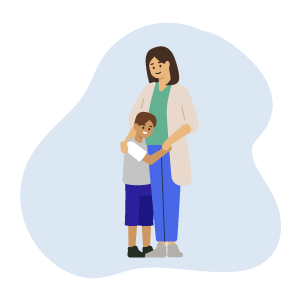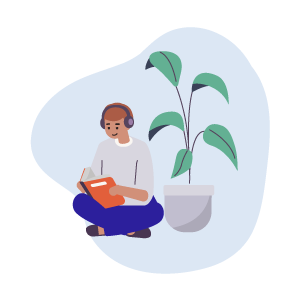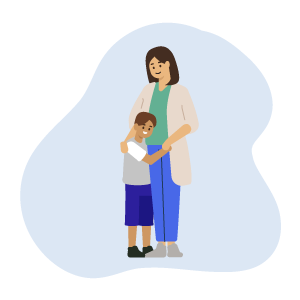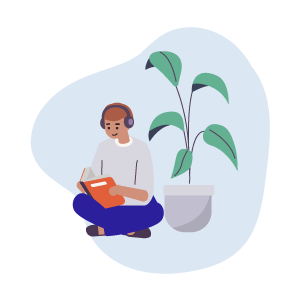How to Adapt to Online Learning at Home: Tips for Guardians, Educators and Students

Staying focused while trying to take a class from your kitchen or bedroom can be tough—and many parents and students have learned this lesson over the course of the pandemic. Without teachers there to keep students on task, television, video games, siblings, pets, food and household chores can easily pull focus, interrupting important online learning sessions and homework. So what can parents and students do to stay on track?
“Every single situation is different,” said Jessica Rendeiro, a teacher at an elementary school in Newark, New Jersey. “Everyone has different needs, so you always check in and assess things on an individual basis.”
Rendeiro and her husband Troy Mullins, a teacher in Montclair, New Jersey, get to see both sides of the coin, as educators and parents to twin 7-year-olds.
“We’re trying to maintain as much of normal life at home as possible,” Mullins said.
But both recognize that nothing is normal about the coronavirus pandemic, and many parents are navigating learning at home and learning online for the first time. For the couple, being flexible as educators is key as they work to help parents and guardians adapt to distance learning. Teach.com asked Rendeiro and Mullins to share their tips for parents and educators about how to transition to learning at home.

Tips for Parents or Guardians
ON ADAPTING TO DISTANCE LEARNING
Set clear expectations. It’s important to have a direct discussion with kids to remind them that although they are home, they aren’t on vacation, Mullins said.
Provide structure and stick to it. Each morning identify what work needs to be done and how you plan to tackle that work as a family, particularly if you have to share devices.
Establish a working space for kids. This space should be where they feel most comfortable completing work. Feeling comfortable can help them perform better, Mullins pointed out.
Don’t allow what wouldn’t be allowed in the classroom. Kids don’t have television and video games while they are learning in the classroom, so those devices shouldn’t be on while they are learning at home.
Give kids breaks. Kids can only focus for so long, Rendeiro noted, so parents should give children breaks from work before moving to another assignment. If they are only able to do 15 minutes of continuous work at a time, that’s OK.
Use positive reinforcement. The television shouldn’t be on while they are completing an assignment, but motivating children by saying they can have an outdoor break or more TV time after work can help them remain on task.
Remember that the school staff is there to help. If you have concerns or challenges, voice them to teachers. And note that for students who might have special needs, social workers, school counselors and other support staff are often still working and available to help, Rendeiro said.
Rely on your fellow parents as resources. Other families in your neighborhood are learning how to navigate this situation as well and may be able to offer help if you struggle to understand an assignment.

Tips for Educators
ON WORKING WITH GUARDIANS
Recognize the reality that many families are experiencing. Many parents are working, they have multiple kids, each child has multiple teachers, and they only have a limited number of computers, if any at all. “They’re just so overwhelmed with all the different teachers and assignments that they can’t really figure out how to do it,” Mullins said.
Be flexible with assignments. Maintain structure and encourage students to hand in assignments on time, but due dates can be pushed as a result of the extraordinary circumstances. If parents are struggling to keep up, Rendeiro encourages them to do as much as they can, even if that means completing two assignments instead of three.
Encourage communication with parents. Rendeiro uses ClassDojo, which allows her to communicate directly with parents and get immediate feedback. It also helps translate for parents who primarily speak another language.
Be clear. Streamline assignments and use easily understandable language that outlines expectations. Parents have different levels of understanding and are not trained educators. Avoid jargon or overly academic vocabulary.
Take things offline. Not everyone has access to a computer or to the internet. Account for those students by creating packets that cover lessons and homework.
Give open-ended assignments. Again, students may lack resources that extend beyond just internet access. Rendeiro develops assignments that can be completed by simply reading or watching the news.

Tips for Students
ON STAYING FOCUSED WHILE LEARNING AT HOME
Parents and educators are not solely responsible for keeping students focused, particularly for students who are older. That doesn’t mean that staying on task will be easy.
“What’s really important is that you have to learn how to take control and be more self-directed,” said Myron Dembo, author of Motivation in Learning Strategies for College Success: A Focus on Self-Regulated Learning.
Dembo shared the following strategies for students who want to learn how to become more self-directed.
Set a goal. “Goal setting is one of the most important aspects of motivation because without goals, there’s just no motivation,” he explained. Decide which chapters you are going to read or what homework you plan to complete before you start working.
Plan your time. If you are working on multiple subjects, you need to know how much time you want to spend on each before you begin. Write out how you plan to divide your time.
Establish a helpful learning environment. You should be able to control and minimize your external distractions. If you are working in a living room, you likely can’t control who walks in. If you’re in your own room, you can close doors, lower music and shut windows.
Gather necessary materials and tools. Have all of the necessary materials for studying or learning readily available in your learning space so that you don’t have to break concentration looking for things.
Alternate subjects. Boredom is a legitimate factor to account for when learning at a distance. “If you’re stuck on something for a long period of time … it’s okay to go to another subject, do some work and then come back to that subject,” Dembo said.
Take breaks. Breaks help maintain motivation and avoid fatigue that can lead to daydreaming. Take 10-minute breaks for every 50 minutes of work.
“Becoming self-directed during a time of distance learning is not going to automatically happen overnight,” Dembo said. But taking a more mindful approach to learning can help students adapt as they transition to education at home.
This article was published in June 2020.



